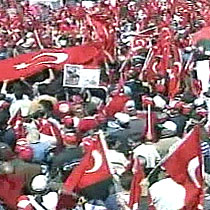-
(单词翻译:双击或拖选)
By Bill Rodgers
Washington
07 May 2007
Turkey's Islamic-rooted government is pushing for a constitutional amendment1 to allow the president to be elected by popular vote instead of by parliament, following two failed attempts to get its foreign minister selected as president by lawmakers. The presidential succession issue is at the center of a standoff between the ruling party and the secular2 opposition3, which fears Turkey's traditional secularism4 is in danger. An early general election has been called in an attempt to defuse the political crisis. More from VOA's Bill Rodgers.
 |
| Demonstrators in Ankara |
Mr. Erdogan and his Islamist-leaning ruling Justice and Development Party want Foreign Minister Abdullah Gul to become president. But Turkey's secularist8 political establishment opposes this – fearing such a move would lead to a radical9 Islamist government.
Professor Dennis Sandole monitors Turkish affairs at George Mason University's Conflict Analysis and Resolution Institute. "I think many Turks who are secularists believe that with the progressive radicalization of Islamists, including Turkey, the chances are great that Prime Minister Erdogan and Foreign Minister Gul, maybe President Gul, might be the tip of the iceberg10, might be the Trojan Horse for the further radical Islamization of Turkey," he says.
Mustafa Kemal Ataturk, modern Turkey's founder11 and first president, strove to imprint12 a secularist ideal on his Muslim country. Successive governments have maintained secularism. There are bans, for example, to wearing Islamic headscarves in public offices and schools.
And it is the issue of headscarves, worn by , that has become politically divisive -- and a symbol for the opposition to Gul's possible presidential intentions. Dennis Sandole explains the opposition view.
"If he becomes president, which is a strong position in Turkish politics,” says Sandole, “he will facilitate the further progressive Islamization of Turkish society – and that against the background of what is taking place in the region, which is the further radicalization of Muslims – looks to many secular Turks, who are Muslim in their identity but who don't want to wear headscarves – as a threat."
Turkey's powerful military, which sees itself as the defender13 of Ataturk's secular legacy14, has warned it would intervene if Mr. Erdogan strays too far from secularism. But the military's warning was received negatively by Turkey's allies, including the United States.
State Department spokesman Tom Casey had this to say: "We believe that a free and democratic Turkey in which the Turkish people decide for themselves who their leaders are is critical for that country. It is critical for Europe and it is critical for the world and we will continue to support and call for respect for the constitutional order and democratic process in that country."
For now, Turkey's military – which has overthrown15 several governments in the past 40 years – appears prepared to stay in the barracks, while ordinary Turks await the next political development.
 收听单词发音
收听单词发音
1
amendment

|
|
| n.改正,修正,改善,修正案 | |
参考例句: |
|
|
|
2
secular

|
|
| n.牧师,凡人;adj.世俗的,现世的,不朽的 | |
参考例句: |
|
|
|
3
opposition

|
|
| n.反对,敌对 | |
参考例句: |
|
|
|
4
secularism

|
|
| n.现世主义;世俗主义;宗教与教育分离论;政教分离论 | |
参考例句: |
|
|
|
5
decided

|
|
| adj.决定了的,坚决的;明显的,明确的 | |
参考例句: |
|
|
|
6
annul

|
|
| v.宣告…无效,取消,废止 | |
参考例句: |
|
|
|
7
quorum

|
|
| n.法定人数 | |
参考例句: |
|
|
|
8
secularist

|
|
| n.现世主义者,世俗主义者;宗教与教育分离论者 | |
参考例句: |
|
|
|
|
9
radical

|
|
| n.激进份子,原子团,根号;adj.根本的,激进的,彻底的 | |
参考例句: |
|
|
|
10
iceberg

|
|
| n.冰山,流冰,冷冰冰的人 | |
参考例句: |
|
|
|
11
Founder

|
|
| n.创始者,缔造者 | |
参考例句: |
|
|
|
12
imprint

|
|
| n.印痕,痕迹;深刻的印象;vt.压印,牢记 | |
参考例句: |
|
|
|
13
defender

|
|
| n.保卫者,拥护者,辩护人 | |
参考例句: |
|
|
|
14
legacy

|
|
| n.遗产,遗赠;先人(或过去)留下的东西 | |
参考例句: |
|
|
|
15
overthrown

|
|
| adj. 打翻的,推倒的,倾覆的 动词overthrow的过去分词 | |
参考例句: |
|
|
|















